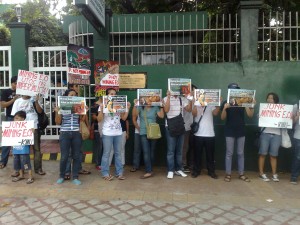Militants slam Aquino policy as same old ‘plunderous mining law’

Militants rally in front of DENR office on Visayas Avenue in Quezon City on Monday, July 9, 2012, to protest the new EO for mining policy. Photo by INQUIRER.net's Noy Morcoso III
MANILA, Philippines—Brickbats against the administration’s new mining policy came fast and furious from militants on Monday, as they criticized President Aquino’s executive order for adhering closely to what they described as the country’s existing oppressive mining law and failing to underscore the need for environmental and people protection.
“For all the hoopla surrounding this EO, it is still a reaffirmation of the plunderous Mining Act of 1995, which groups have blamed for large-scale and destructive mining all over the country. Proof of this is that the EO reaffirms and validates all existing mining contracts,” Bayan secretary general Renato Reyes said in a statement.
“This is a victory for the big mining firms, but it’s a dud as far as the people are concerned,” Reyes added.
He said the administration must move outside the framework of the existing mining law and embark on a radical reorientation of the industry.
“This will entail a reorientation of the mining industry toward meeting people’s needs and the needs of national industrialization, and not the profit requirements of the big multinational corporations,” he said.
Article continues after this advertisementClemente Bautista of the Kalikasan People’s Network for the Environment said the administration should have focused on addressing the actual problems associated with the industry, such as the destruction of the environment and displacement of people.
Article continues after this advertisement“Mr. Aquino’s EO proves that the government still misses the point on what the core problems of the mining industry are. It continues to ignore the necessity to replace the mining law with stringent policies on environmental regulation, greater state role and advancement of the people’s welfare as espoused in the people’s mining bill pending in Congress,” Bautista said.
Reyes also said the government’s intent to raise its revenue from mining may be hijacked by the powerful lobby of mining firms in the legislature. The government is waiting for new legislation from Congress to determine the new revenue-sharing scheme and would not enter into new mineral agreements in the meantime.
“We can only expect the powerful lobby of the Chamber of Mines to go full swing to stop any legislation that will be detrimental to the profits of the big mining firms,” Reyes said.
With the new policy, he said, mining in the country would continue to be geared toward exports and would have little trickle-down effect on the economy and the ordinary Filipinos, whose environments face the risk of destruction from mining activities.
“Any mention of developing a downstream industry to process mineral wealth appears to be just an afterthought. Mining in the service of national industrialization does not seem to be a priority for the government. There is also the token mention of strict enforcement of environmental standards,” he said.
Bayan also lambasted the dilution of the local government’s power to regulate mining activities, as the executive order directs local officials to confine themselves to imposing “reasonable limitations” on mining activities.
Kalikasan’s Bautista also said the executive order would undermine the local government’s authority and the primacy of other national environmental laws.
“The mining EO will prioritize the pro-foreign mining provisions of the Mining Act of 1995 whenever destructive and pollutive mining operations are legally disputed. Provisions on the expansion of mineral reservations are still in place, which prioritize mining over other land uses that would threaten communities and other critical ecosystems within mining tenements,” he added.